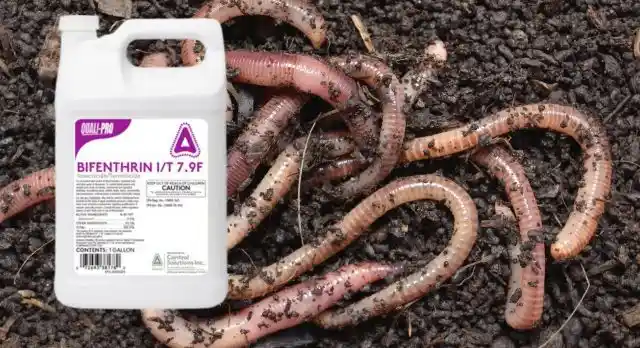Does Bifenthrin Kill Earthworms? Unveiling the Truth
Yes, bifenthrin does kill earthworms. Bifenthrin is a pyrethroid insecticide that is highly toxic to earthworms when applied to soil. Even low concentrations of bifenthrin have been shown to be lethal to earthworm populations in agricultural studies.
When it comes to pest control and managing unwanted insects, bifenthrin is a commonly used insecticide. However, its impact on non-target organisms, particularly earthworms, has raised concerns among environmentalists and gardeners alike.
In this comprehensive article, we will delve into the effects of bifenthrin on earthworms, exploring the research and shedding light on the topic. Read on to discover the truth behind whether bifenthrin poses a threat to these essential soil-dwelling creatures.
Bifenthrin and Its Uses
Bifenthrin is a synthetic pyrethroid insecticide widely used in agriculture, horticulture, and home gardens. It is favored for its effectiveness in controlling a broad spectrum of pests, including insects like aphids, caterpillars, mites, and termites. Bifenthrin works by targeting the nervous system of these pests, disrupting their normal functioning and ultimately leading to their demise.

Does Bifenthrin Kill Earthworms?
Bifenthrin, like many pesticides, can indeed have an impact on earthworms. When applied to the soil or on plant surfaces, bifenthrin can come into contact with earthworms in several ways:
- Direct Contact: Earthworms may come into direct contact with bifenthrin when they move through treated soil or consume contaminated plant material.
- Residue Uptake: Bifenthrin can persist in the environment, and earthworms may inadvertently consume residues when they feed on treated plants or organic matter.
- Soil Absorption: Earthworms may absorb bifenthrin through their skin when in contact with contaminated soil.
The consequences of bifenthrin exposure can vary based on factors such as the concentration of the chemical, the earthworm species, and environmental conditions.
The Relationship between Bifenthrin and Earthworms
Understanding Earthworms and Their Importance
Earthworms are soil-dwelling organisms that play a crucial role in soil health and ecosystem functioning. They enhance soil structure, nutrient cycling, and water infiltration, making them beneficial to plants and overall soil fertility. The presence of earthworms indicates a healthy and vibrant soil ecosystem.
Research Findings on Bifenthrin’s Impact on Earthworms
Numerous studies have investigated the effects of bifenthrin on earthworms, and the results are diverse. Some studies suggest that earthworms can be adversely affected by bifenthrin exposure, experiencing reduced survival, growth, reproduction, and behavior changes. However, it is important to note that these effects are dose-dependent, and higher concentrations or prolonged exposure are more likely to cause harm.
Factors Influencing Earthworm Sensitivity
Several factors can influence the sensitivity of earthworms to bifenthrin. These include the earthworm species, their life stage, soil type, bifenthrin concentration, application method, and environmental conditions. Different species may exhibit varying levels of tolerance or sensitivity to bifenthrin. Additionally, juvenile earthworms are generally more susceptible to pesticides than adults.
Ecological Considerations and Risk Assessment
While studies have demonstrated potential negative effects of bifenthrin on earthworms, it is crucial to consider the ecological context and conduct thorough risk assessments. Real-life exposure scenarios, such as the use of recommended application rates and best practices, can significantly reduce the potential impact on earthworm populations. Proper pesticide management, including targeted application, avoiding excessive use, and considering alternative pest control methods, can help minimize risks.
Factors Influencing the Impact of Bifenthrin on Earthworms
Understanding the nuances of the interaction between bifenthrin and earthworms requires considering various factors:
- Concentration: The concentration of bifenthrin in the environment significantly influences its impact on earthworms. Higher concentrations are more likely to have adverse effects.
- Exposure Duration: The duration of exposure also plays a crucial role. Prolonged exposure to bifenthrin is more likely to result in harm.
- Earthworm Species: Different species of earthworms may exhibit varying levels of sensitivity to bifenthrin.
- Environmental Conditions: Environmental factors such as temperature, moisture, and soil composition can influence the interaction between bifenthrin and earthworms.
Read More – Does Sevin Dust Kill Earthworms?
Key Takeaways
- Bifenthrin is a widely used insecticide known for its effectiveness against various pests.
- Earthworms are essential soil organisms that contribute to soil health and ecosystem functioning.
- Research findings on bifenthrin’s impact on earthworms are diverse, with adverse effects observed at higher concentrations or prolonged exposure.
- Factors such as earthworm species, life stage, soil type, and environmental conditions influence earthworm sensitivity to bifenthrin.
- Proper pesticide management practices and risk assessments are essential to mitigate potential harm to earthworm populations.
In conclusion, while bifenthrin can have detrimental effects on earthworms under certain conditions, responsible pesticide use, adherence to recommended application rates, and considering alternative pest control methods can help strike a balance between effective pest management and preserving the vital role of earthworms in our ecosystems. It is imperative to stay informed, consider scientific research, and adopt eco-friendly practices to ensure a sustainable and harmonious environment.
